‘I am a real person’: How social media shapes creative lives
Gatlin Milam buys clothes from a business partner for his store. Milam works full time to stock and build his business, using Instagram and TikTok to help advertise his hauls.
March 21, 2022
From pictures of vibrant colored flowers and bright smiles to photos at local businesses, Alexis Mueller shares most of her life with her 50,000 Instagram followers.
Mueller creates lifestyle and fashion content, while also studying marketing with a concentration in sales at WKU.
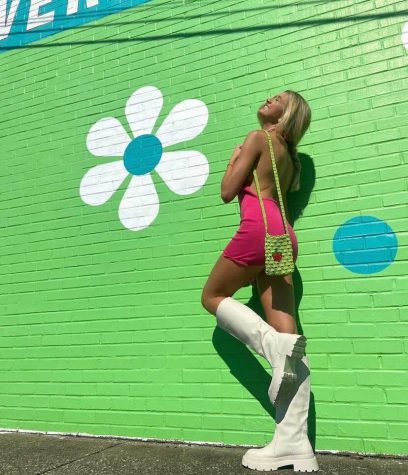
“I started to post pretty consistently and have an overall aesthetic to my page,” Mueller said. “When I started to do that, that’s when a few companies started to slowly reach out to me. Then I started to reach out and email companies on my own and that’s when it all really began.”
Despite this, Mueller finds that social media has negative impacts on her mental health.
According to a study by USwitch, Americans are spending up to 53 minutes a day on apps like Instagram, which is approximately 297 hours a year, a little over 12 days.
“I would say a con would be getting too wrapped up in it all, I like to set a timer on how much I’m allowing myself to be on social media and to instead read a book, workout, take a bath, make a meal and to be in the moment actually,” Mueller said. “It has to be a good balance.”
In order to manage content for her Instagram, Mueller has “batch content days” where she shoots as much content as she needs at once.
“A couple days before, I’ll plan out my outfits and try to find certain locations to compliment the outfit and to just have fun and get creative with it,” Mueller said. “Then when it comes to the content day, I’ll take around 6-8 pictures to have for the week. I also always love to get in-the-moment unplanned pictures too because those are always the best.”
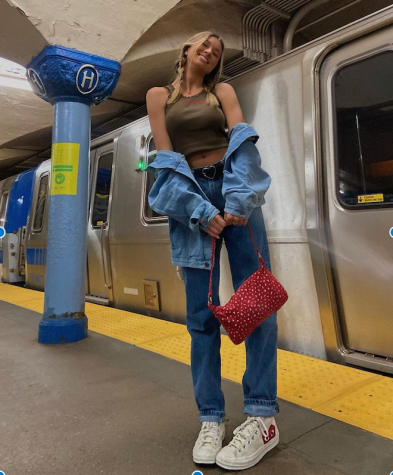
Mueller currently studies marketing with a concentration in sales. She said being an influencer aligns with her career aspirations within social media marketing and the fashion industry. She plans to continue growing her following after she graduates.
“It definitely is a challenge managing both content creation and schoolwork, I have to stay really disciplined about leaving time for both homework and social media equally,” Mueller said. “But [I] wanted to be able to do both because content creating is my passion.”
Mueller said social media helps her find inspiration for content, outfits and many other aspects of her life, but it has also been a way for her to make friends all over the world.
“I also have met so many friends from all over the world from social media who do what I do and we always hype up and support each other,” Mueller said.
Despite content creation being Mueller’s job, social media still takes a toll on her. Comparing yourself to what others post to social media is a habit Mueller and many others deal with due to seeing what people choose to share online.
“It definitely can have a negative and both positive impact on my mental health, when it comes to social media everyone is usually only putting out their best moments and not the real stuff of what is happening behind the scenes, and you really have to keep in mind to not compare, it’s not a race,” Mueller said. “‘Whatever is meant for you will be yours’ is what I try and tell myself when I catch myself comparing my life to others on social media and where I’m at with it.”
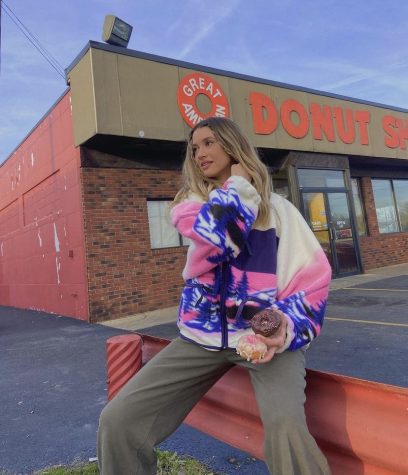
According to the Pew Research Center, 69% of U.S. adults are social media users. Social media is especially popular among younger adults, as 86% of 18- to 29-year-olds are social media users.
Karl Laves, assistant director of the WKU Counseling Center, finds that the impacts of social media, both good and bad, vary based on the person.
“Social media could be a source of comfort or connection for some insecure students,” Laves said. “For others, it might be a constant reminder that they are not good enough. It really depends on what the students choose to view.”
Learning ways to limit time spent on social media is one way to lessen its impacts. According to Statistica, the global daily average of time spent on social media platforms in 2021 is 142 minutes, almost 10% of an entire day, but this number varies from person to person.
Studies have shown that adults who watch TV or use a computer for more than six hours per day are more likely to experience moderate to severe depression, according to the Center for Anxiety Disorders.
“I would argue that the problem is not social media, no more than the problem is alcohol,” Laves said. “The problem is the people that use social media or alcohol. Some people can use it responsibly, some can’t. But it is human nature to blame the thing, the object, the material instead of the person.”
Laves recommends reaching out to friends and family to discuss any issues regarding social media, or reaching out to resources including the WKU Counseling Center, the WKU Psychology Clinic and Graves Gilbert Clinic at WKU.
Laves suggests that students should think about the motivations behind a person’s social media post.
“Ask yourself why someone would post such a thing; what is their motivation, what is their reward, what are they selling?” Laves said.
More than eight-in-ten U.S. adults (86%) say they get news from a smartphone, computer or tablet “often” or “sometimes,” according to the Pew Research Center.
When people can’t use social media responsibly, misinformation spreads easily, through Twitter and Facebook specifically.
Out of former President Donald Trump’s 10 most popular tweets, four contained false claims related to the 2020 election results, according to CNBC. Of his 100 most popular tweets, 36 contained election-related falsehoods.
After the Jan. 6 insurrection in the U.S. Capitol, Twitter permanently banned President Donald Trump’s account “due to the risk of further incitement of violence.” Trump had 88 million followers at the time he was banned.
A study by University of Colorado Boulder researched the relationship between spreading misinformation and one’s political ideology. In the Facebook sample, those self-identified as extremely conservative—7 on a scale of 1 to 7—accounted for the most fake news shared, at 26%. In the Twitter sample, 32% of fake news shares came from those who scored a 7, according to the study.
However, those who scored a 1, identifying as extremely liberal, also shared fake news regularly, accounting for 17.5% of shares on Facebook and 16.4% on Twitter, according to the study.
Some content creators focus on being informative, like Andre Swai who creates TikToks about politics.

Swai – or @corneleast, as his 47,000 TikTok followers know him – is a junior at WKU who uses social media to share his thoughts on politics and film.
“I usually only make political Tiktoks about stuff that I’m passionate about, or stuff that I am pretty well versed and that I know about, which is anti-black racism [and] American policy,” Swai said.
Swai said TikTok has several anti-black problems, such as black content creators experiencing lower engagement after posting about the Black Lives Matter movement, as well as racism on the platform in general.
“I’m an Afro-pessimist, which is a branch of theory that has to do with anti-Black racism. And that hashtag, literally, you’re not allowed to do it on TikTok,” Swai said. “You’re not allowed to put ‘hashtag Afro-pessimism’. You’re not allowed to put ‘hashtag white supremacy’, which makes sense, but it’s weird that they’re lumping Afro-pessimism with white supremacy.”
Despite these features, Swai finds TikTok an easier app to build a following than other video-hosting platforms.
“There’s plenty of alternatives to TikTok, whether it be Instagram or YouTube, but the fact is TikTok is not only the easiest platform to use, it is the platform that will get you the most engagement for the least amount of work,” Swai said.
Platforms like TikTok – including Instagram, Snapchat and Facebook – have adopted the same principles that have made gambling addictive. Users regularly receive “hits” of dopamine while using the app, training them to come back time and time again, according to Forbes. Dopamine is a neurotransmitter that impacts how we feel pleasure.
“The TikTok algorithm is designed to give you a hit of dopamine every eight seconds, and that has had a disastrous impact on my ability to focus – TikTok is so addictive,” Swai said. “People really underestimate how addictive TikTok as an app is.”
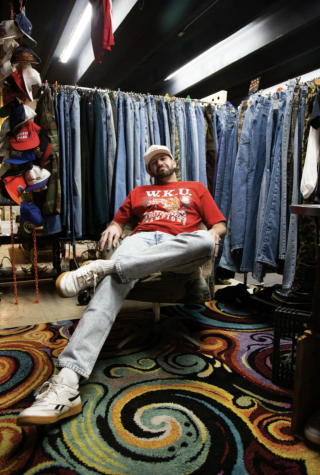
Swai said TikTok has had both negative and positive impacts on his mental health.
“For a lot of people, platforms like TikTok allow them a community of people that they’ve never been exposed to in their lives,” Swai said. “It’s the community they’ve been looking for their entire life, and then they finally have people who will accept them for who they are. But on the other hand, if you are a content creator, and one of your videos blows up, there’s a lot of negative feedback to it.”
Other kinds of misinformation relating to COVID-19 have spread rapidly due to social media.
At the University of Wisconsin-Milwaukee, a study was conducted by doctoral student Amir Forati and master’s student Rachel Hansen on the geographical impact of social media in regards to the COVID-19 pandemic. Using statistical methods and geotagging, Forati found that locations with heavy Twitter misinformation in May and June 2020 later experienced a rise in the number of cases in July.
Their research shows that a running theme of tweets geotagged in Kentucky falsely compared the COVID-19’s severity to the flu.
Gatlin and Maddie Milam run Vette City Vintage. The couple have been selling vintage items since 2018, and in that time, their Instagram account has gained almost 13,000 followers. Maddie is also an intensive care unit nurse at a local hospital in Bowling Green.
“When the pandemic was really at its peak and it was really affecting my wife, I felt really compelled to express how she was feeling,” Gatlin said. “…[I] tried to encourage people to get vaccinated and to be cautious, because of a lot of ignorance and people straight up just spreading nonsense [that] could hurt people. Opinions like that were affecting my wife at work. She was taking care of people because they refused to get vaccinated or didn’t take precautions or didn’t really think COVID was a real issue.”
Beyond just Instagram, Gatlin has started using TikTok as another platform to share his found items, clothing try-ons and his sense of humor.
“Of course, I’ll make efforts to make it grow but it is growing organically,” Gatlin said. “I think I can get my TikTok to start growing like my Instagram has, but I have never been focused on Facebook. I do have a Facebook page for the store because you are required to have it in order to tag products.”
Gatlin has tried to remain positive and avoid posting about his personal problems, but has gotten more comfortable sharing his own life.
“I try to always keep it positive. Not always positive, but I feel like 90% of the time, I post positive things,” Gatlin said. “I’m not going to share anything I’m going through, like problems that I’m having, because people might care but I don’t want to bring that into the business.”
When Gatlin began the shop three years ago, he originally did not share aspects of his personal life because he felt social media followers on social media wouldn’t care.
“I really learned over the past couple of years that people are very interested in who I am and how I do what I do,” Gatlin said. “I want to share who I am. I like to give people a peek into my life. I am a real person. It’s definitely cool to see that people care about who you are and like to get to know you. Now it’s not just a store, it’s also me and who I am.”
Content Editor Debra Murray can be reached at [email protected]. Follow her on Twitter @debramurrayy.

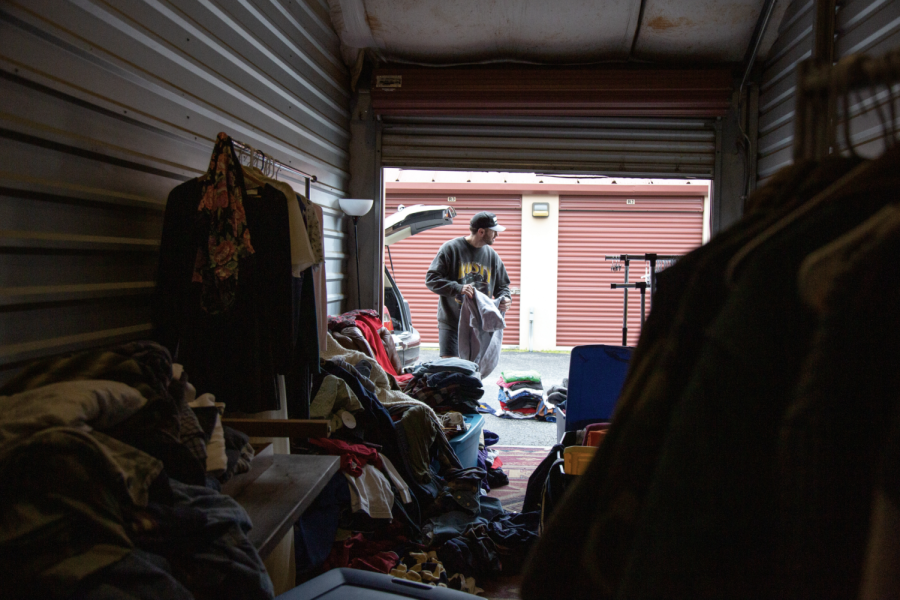



















![Megan Inman of Tennessee cries after embracing Drag performer and transgender advocate Jasmine St. James at the 9th Annual WKU Housing and Residence Life Drag Show at Knicely Conference Center on April 4, 2024. “[The community] was so warm and welcoming when I came out, if it wasn’t for the queens I wouldn’t be here,” Inman said.](https://wkuherald.com/wp-content/uploads/2024/04/smith_von_drag_3-600x419.jpg)



